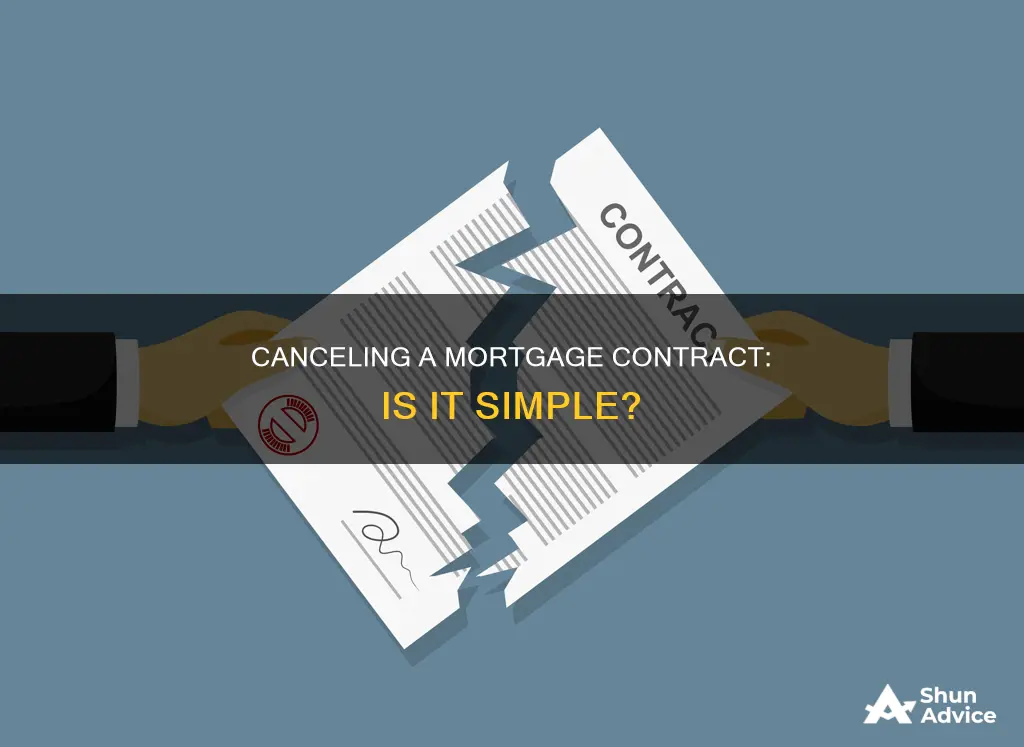
A mortgage contract is a binding agreement between a lender and a borrower, but federal law allows the borrower to cancel the contract within three business days of signing the loan papers. This is known as the right of rescission, a grace period that gives borrowers time to reconsider their decision. Cancelling a mortgage contract can be done for various reasons, including financial challenges or problems with the property. The process for cancelling a mortgage contract can vary depending on the state and specific circumstances, and it is important to understand the potential consequences and legal implications.
| Characteristics | Values |
|---|---|
| Time period to cancel the contract | Within three business days of signing the loan papers |
| What to do if you want to cancel | Find the document titled "right of rescission" and mail or bring it to your lender within 72 hours of closing |
| What to do after cancelling | Request a written release from the lender |
| What if you didn't receive the Truth in Lending disclosure or the notice of your right to rescind? | Consult an attorney as you may be able to rescind your loan up to three years from the date of closing |
| What if you are unable to make mortgage payments? | Speak with your lender as soon as possible, list your home for sale and find a buyer, pay off the reverse mortgage with personal savings or by taking out a conventional loan, or refinance to a traditional loan |
| What if the seller fails to meet their obligations? | You have legal grounds to cancel the contract |
| What if you cancel without the property contingency in place? | You will likely forfeit that money and face additional penalties such as being sued for breach of contract or having to compensate the other party for their losses and expenses |
What You'll Learn

Cancelling a mortgage contract within the first three days
To cancel a mortgage contract within three days, you must notify the lender in writing. This can be done by signing and returning the "Notice of My Right to Rescind" document that the lender should have provided, or by sending a letter. This notice must be delivered or mailed before midnight of the third business day after the contract date, and Saturdays are considered business days, while Sundays and federal holidays are not. It is advisable to get proof of the time and date of delivery, such as a receipt or photographic evidence.
Once the lender receives the cancellation notice, they have 20 days to return any money or property paid as part of the transaction and release any security interest in your home. If you received money or property from the creditor, you may retain it until they can show that your home is no longer being used as collateral. After this, you must offer to return the money or property, and if the creditor does not claim it within 20 days, you may keep it.
It is important to note that the three-day cancellation rule may not cover all mortgage contracts, and there may be exceptions or extensions to the rule under state or local laws. If you have questions or concerns about your specific situation, it is recommended to consult a real estate attorney or financial advisor.
Mortgage Modifications: Understanding the Changes to Your Original Contract
You may want to see also

Cancelling due to financial challenges
Cancelling a mortgage contract due to financial challenges is possible, but it is important to understand the potential financial and legal consequences. Both buyers and sellers can back out of a home purchase agreement, but the ease of doing so will depend on the contract's wording and whether there are any contingencies in place.
If you are facing financial hardship and struggling to make your mortgage payments, it is advised that you speak with your lender as soon as possible. Your financial provider may be able to offer ideas, suggestions, and support to help you through this challenging time. For example, you may be able to refinance your reverse mortgage into a traditional loan with more favourable terms, such as a lower interest rate. Alternatively, a loan modification can change the original terms of your mortgage loan, altering the conditions of your loan agreement.
If you have a financing contingency in your contract, you can use this to back out of the purchase if your mortgage loan falls through. This could be because you have lost your job or are facing mounting medical bills and growing credit card debt. In this case, you can cancel the contract without losing your earnest money.
In some cases, you may need to sell your home to pay off the remainder of your home mortgage loan. A short sale happens when homeowners facing financial hardship agree with their lender to sell their home for less than they owe on the mortgage. The lender then receives all the proceeds from the sale and may forgive the remaining balance or arrange for later repayment.
It is important to act quickly if you need to cancel a pending mortgage application. In the US, you may have a three-day window after signing the loan papers to cancel the application and recover any fees paid. This is known as the "right of rescission" and is provided for in the Federal Truth in Lending Act. To cancel, you must notify your lender in writing that you are cancelling the loan contract and exercising your right to rescind.
SunTrust Mortgage: Navigating Foreclosure and Your Options
You may want to see also

Cancelling due to problems with the house
Cancelling a mortgage contract due to problems with the house is possible, but there may be financial consequences. It is best to do this before closing the sale, as it can be more difficult to cancel a contract after this point.
A home inspection contingency gives buyers the right to cancel a contract based on the findings of a home inspector. If the property fails to pass inspection, this could mean costly repairs are imminent, and the buyer can use this as grounds to cancel the contract. Buyers may also be able to renegotiate with the seller, requesting that issues be repaired before closing, or that the seller offers credits towards closing to allow the buyer to make the repairs themselves.
If you have already closed the sale, you may still be able to cancel the contract if you can prove that the seller breached the contract in some way. For example, if they failed to allow your home inspector access to the property, this could be grounds for cancellation. In this case, it is best to consult an attorney to determine your rights under the contract and any state laws and regulations that may apply.
It is important to note that cancelling a mortgage contract can have financial repercussions, such as losing your earnest money or deposit. There may also be cancellation fees and penalties associated with terminating the contract. However, these charges may be insignificant compared to the cost or emotional anguish of being stuck with a home you do not want.
Mitigating Risk: Strategies in the Mortgage Industry
You may want to see also

Cancelling a pending mortgage application
Understanding Your Mortgage Agreement and State Laws
Firstly, it is crucial to understand the components of your mortgage agreement, application, and the process for termination. Familiarize yourself with the terms and conditions of your agreement to identify any provisions related to cancellation or termination. Some contracts may include a specified time frame during which you can cancel without penalty. Additionally, research and understand the state laws and regulations that apply to your situation, as these can vary and impact your options for cancellation.
Communicating with Your Lender
If you need to cancel a pending mortgage application, act quickly. Contact your loan officer, broker, or lender immediately to inform them of your intention to cancel. Provide a reason for the cancellation, as this can help the lender understand your situation and potentially offer alternative solutions. You may have a short window, sometimes as little as three days, to cancel the application and recover any fees paid. Common fees that may be refunded include credit check and appraisal fees, while application processing and rate lock-in fees are usually non-refundable.
Understanding Contingencies and Potential Consequences
Before cancelling, it is important to understand the concept of contingencies. Contingencies are clauses in your contract that allow you to withdraw if certain conditions are not met. Common contingencies include financing, which lets you back out if your mortgage loan falls through, and home inspection, which allows you to cancel if problems are found during the inspection. If you cancel without applicable contingencies in place, you may face consequences such as forfeiting earnest money and potential legal action for breach of contract.
Obtaining Confirmation and Release
After initiating the cancellation process, your lender may be required to provide confirmation of the cancellation over the phone or in person, and they will also typically send a confirmation in writing. Keep all cancellation documents for your records. Once the termination has been agreed upon and any applicable fees have been paid, request a written release from the lender. This document confirms that the mortgage agreement has been officially terminated, and you are no longer obligated by its terms.
Remember, it is always a good idea to consult with an attorney or legal professional to understand your rights and options when dealing with complex legal documents and agreements.
Adding Someone to Your Mortgage: A Simple Process?
You may want to see also

Cancelling a contract after removing contingencies
In general, removing contingencies means that the buyer has waived their right to certain protections and is fully committed to purchasing the property. If you cancel a contract after removing contingencies, you may face consequences such as forfeiting your earnest money deposit and potential legal action for breach of contract. However, there may be valid legal grounds for cancellation, such as a breach of contract by the other party or the discovery of issues with the property.
If you need to cancel a contract after removing contingencies, it is essential to consult with an attorney to understand your rights and options. An attorney can help you navigate the complex world of home financing and determine the best course of action for your specific situation. They can also assist you in communicating with the lender and negotiating any cancellation fees or penalties.
To protect yourself, it is crucial to understand the contingencies in place and their timelines. If possible, it is advisable to halt the purchase of a property while contingency timelines and agreements are still in effect. This allows you to exercise your right to cancel the contract without incurring significant financial or legal penalties.
Additionally, it is worth noting that federal law provides a right of rescission, which allows borrowers to cancel their mortgage within three business days of signing the loan papers without any repercussions. This grace period gives borrowers time to reconsider their decision and walk away from the contract if necessary.
Unlocking Your Mortgage: Borrowing More, Simplified
You may want to see also
Frequently asked questions
Federal law allows the borrower to cancel the mortgage within three business days of signing the loan papers. This is known as the "right of rescission", which is a grace period given to borrowers to reconsider their purchase.
To cancel a mortgage contract, you must notify your lender and provide a signed document titled "right of rescission" within 72 hours of closing. The lender must then immediately cancel the contract and provide a mortgage release document.
Cancelling a mortgage contract can result in certain fees and penalties. If you cancel without a property contingency in place, you may forfeit any earnest money paid and face potential legal action for breach of contract.
If you are facing financial difficulties, it is recommended to speak with your lender as soon as possible to explore alternative options. These may include refinancing to a traditional loan, listing your home for sale, or arranging a deed in lieu of foreclosure to avoid more serious financial consequences.







